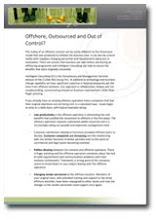The landscape of the employment market is changing. As more people become freelancers, contractors and agency workers, job security becomes less of a priority. According to the Recruitment and Employment Confederation’s (REC) 2014 report, 36% of people have been temporarily employed at some point and 1.7 million currently work this way. So what is attracting people to this dynamic lifestyle?
1. "Could not find permanent work"
For many, temporary work is a necessity, not a choice. Amongst other demographics, the over 45s, inexperienced graduates and those with long periods of unemployment are most likely to experience this.However, a growing number refuse to settle permanently for anything less than their ideal role. For these people, temporary work offers the opportunity to get a ‘foot in the door’ with companies they wish to work for permanently. It is a chance to prove themselves and enhance their CV with directly relevant experience.
2. The desire to find work and to earn money quickly
Being placed swiftly and paid weekly is a common motivator. Businesses are far more likely to employ temporary workers where they can, as the cost of hire is significantly less than for permanent workers. Whilst permanent roles require extensive checks and referrals, temporary employees can often be placed within a week, appealing particularly to young job-seekers and graduates.
3. Higher earning potential and supplementation of income
According to the REC report, the general consensus amongst temporary workers is that in temporary employment, you are paid for your value as opposed to a flat rate. Many skilled specialists opt for temporary employment due to higher earning potential, dependant on their skill. This trend is common amongst nurses and IT professionals; one IT specialist stated, “I can ‘temp’ for three months and earn what I do in a permanent role in four to five”.
13% of contractors work temporarily to supplement their income following insufficient hours in another job. On the contrary, some are keen to maximise an already sufficient income.
4. Flexibility
Flexible working hours empower people to take control of their lifestyle and enable a customisable work-life balance. 25% of temporary workers do so for flexibility based benefits:
- 11% of people utilise flexible working to look after children or dependant adults. For many, flexible working allows them to prioritise care on the understanding that occasionally they may have to miss or rearrange shifts on short notice.
- For some, a more gradual shift to retirement is a serious benefit. Elderly temporary workers can enjoy an incremental reduction of work and the freedom to refuse more physically challenging projects if they choose.
- 14% of people seek flexibility in order to pursue interests or hobbies (i.e. studying).
However, permanent work is likely to also become more flexible in the near future, thanks to the new flexible working laws.
5. Independent working
For many reasons, 14% of workers simply don’t want to work for someone else. For example, organisational politics can adversely affect learning and development, progression and motivation. The brief nature of temporary arrangements can nullify this effect. Many individuals work better independently, and others simply aren’t ‘corporate people’, seeing loyalty to a business as a disadvantage.
5. Independent working
For many reasons, 14% of workers simply don’t want to work for someone else. For example, organisational politics can adversely affect learning and development, progression and motivation. The brief nature of temporary arrangements can nullify this effect. Many individuals work better independently, and others simply aren’t ‘corporate people’, seeing loyalty to a business as a disadvantage.
So with all these benefits and opportunities, why do temporary workers still only contribute around 5% of the workforce? The risks and pitfalls are explored in High Risk, High Reward: Part 2.
References
- REC Report. Flex Appeal: Why freelancers, contractors and agency workers choose to work this way. Recruitment and Employment Confederation (REC).








No comments:
Post a Comment